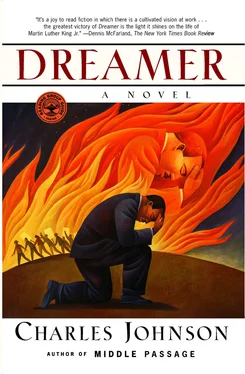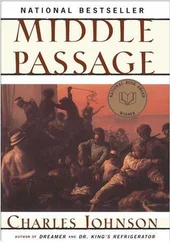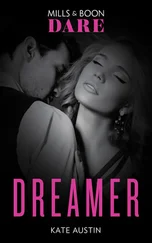He drove the car thief to Sutherland’s place. The Virginian met them at the door, wearing a Confederate colonel’s cap. He invited them into his den, festooned with a rug imprinted with the Stars and Bars and a huge Rebel flag on one wall. There, Sutherland informed them he represented a covert southern group with deep pockets. They would pay $50,000 to anyone who killed the “big nigger” from Atlanta. Was he interested? Byers listened politely, then said he needed a while to think aver the offer. There was little chance he would accept, said the agent — Byers knew danger when he saw it — but in the underworld of Kauffmann, Byers’s brother-in-law, and Ray, it was widely known that an open contract had been issued for King’s head.
It was, he knew, only a matter of time before someone collected that bounty. Pushing aside the papers on his desk (his aides told him he’d already generated close to 200,000 pages of documents), he found his pack of cigarettes. He pulled one out, searched his pockets for a matchbook, then lit the cigarette, extinguished the match with his thumb and forefinger, and sat back in his chair. How many days did he have left? Or should he be thinking now in terms of hours? Maybe minutes? What should a man do when at any moment he might be struck down?
He knew.
If he might not see tomorrow, then what he wished for most was to receive forgiveness from those he’d failed, beginning with his children. And his wife. Whatever failures there were in their marriage he blamed on himself, for no man could have asked for a better partner to share his life since 1952. She was pursuing her music career — as a singer of exceptional talent — at the New England Conservatory when they met in Boston. Yes, she’d heard of him before they met, and her impressions were not favorable. In Boston he was known for the brilliant sermons he delivered at local churches, but Coretta had reservations about the Baptist ministers she’d met. They were so … emotional, and she was hoping to align herself with a less fundamental, more liberal approach to religion. Added to that, the stuffiness of so many Baptist ministers bothered her. And wasn’t this M. L. King just a little too popular with the women in town? She’d heard he was brilliant, and had been accepted at Edinburgh University for graduate work (though Yale turned him down); he brought together other students at his place on St. Botolph Street for meetings of what they dubbed “The Dialectical Society,” at which they as well as their professors presented papers. She’d also heard he was playful, a good dancer and a party boy, a tease who dressed to the nines — a real ladies’ man, by most accounts, and Boston’s most eligible young black bachelor. It was with some reservation, then, that she surrendered to the matchmaking of her friend Mary Powell, who was married to the nephew of his former teacher, Benjamin Mays at Morehouse, and ate at the Western Lunch Box, an eatery specializing in down-home cooking, where black students — he among them — gathered to relax and talk. Mary warned him that Coretta might not be religious enough for his temperament, but at that point in his life he was frustrated by the women he was meeting. The woman he hoped to marry, he told Mary, must have four characteristics: character, intelligence, personality, and beauty. Mary, saying nothing, simply gave him Coretta’s phone number.
When he picked her up in his green Chevy on the Huntington Avenue side of the conservatory — she with her coat buttoned to her throat and wearing a scarf, thinking of the struggles and sacrifices that had brought her from a culturally deprived background to Antioch and at last to her training here — her first thought when his car pulled up had been, Oh my God, look what a runt he is. (In point of fact, he was 166½ pounds that year, 66½ inches tall, and had a blood pressure of 134/64.) To her he at first seemed full of the slick, superficial language — the jive — of black men with only one thing on their minds. But no. As they spent time together that afternoon, in the cold rain of a January afternoon, she began to see deeper into his passion for Continental theology and his people’s deliverance. He was working that term, he said, in directed study with Professor DeWolf on a paper he would entitle “Karl Barth’s Conception of God,” and as he discussed his conclusions with her he grew more animated, explaining that Barth’s God was too removed from man, wholly Other, which he found unacceptable; but there was much in so-called crisis theology that, in his view, corrected liberal Protestantism’s sentimentalization of man. They sat in Sharaf’s Restaurant on Massachusetts Avenue, eating a cafeteria-style lunch. He put down his fork and leaned closer toward her, saying, “Maybe man is more a sinner than liberals are willing to admit.” In his paper’s conclusion he planned to question liberalisms naïve, ivory-tower belief in progress. “Instead of assured progress in wisdom and decency man faces the ever-present possibility of swift relapse not merely to animalism but into such calculated cruelty as no other animal can practice.” Talking on, waving his fork then, he watched her closely for her reaction, and was pleased by her attention and her bobbing her head in agreement when he said, “The word sin has to come back into our vocabulary. One hoary meaning of the word is ‘to miss the mark,’ as when an arrow goes astray. I like that. What do you think?”
“ I think you’ve given it a lot of thought,” she said.
Yes, he was far more than she’d expected.
And he could not keep his eyes off her. That day she was wearing bangs with a natural wave. That he liked. Indeed, he liked everything about her, even though he knew he would have to confront Daddy King head-on — a thing he dreaded more than anything else — when he brought this stunning woman, who was not one of Ebenezer’s own, home and introduced her as his fiancée. “You,” he told her, “are my Waterloo.”
No man, he knew, would ever have a better companion by his side. When they were married in Alabama on June 18, 1953, the local Jim Crow laws prohibited them from spending their wedding night in a hotel. Instead they found lodging at a black funeral home. Yes, they had been through much together. As in most traditional, black southern Baptist households, she followed his lead, going so far as to let him tell her how she should dress or when she should fix herself up a little. If these were faults — failures in his understanding of equality — he regretted them, because in those early years of their marriage he felt liberated by her to at last be himself. He owed her that, an intimacy he’d never experienced before, one possible only through the strange alchemy of marriage, where two once separate and distinct histories blended to become a single destiny. True, he learned that this kind of love involved suffering, the extinction of the ego, but the trade-off, especially after the children were born, was his rebirth as a fully communal being, a man working in concert with another for the welfare of his family, which reinforced his passion for politics and social justice. In his later speeches, the ones assailing America’s crass and vulgar materialism, he was fond of saying, “The great problem facing modern man is that the means by which we live have outdistanced the spiritual ends for which we live.” What he didn’t say — and now wondered if he should have — was that through Coretta’s love he’d come to know that ecstatic freedom and the fullness of being-with.
He wondered how badly she’d been hurt by the stories about his sexual affairs. There were women all over the country who claimed they’d known his affections. The rumor mill thrived on tales about the Kennedy brothers, or Lyndon Baines Johnson, who, according to a widely circulated and probably false report, unzipped his pants during a White House meeting and dropped his Texas-sized member on the conference table, asking, “Does Ho Chi Minh have one of these?” Because the public loved stones like these about the famous and powerful he was not surprised to hear them said about himself. But did any of his detractors stop once to admit that these stories about his wearing sunglasses and meeting women at a restaurant in Riverdale, and soliciting prostitutes, were all secondhand? Anything that came from the FBI — their saying, for example, that the wife of a California dentist was his mistress — was tainted, given their campaign to discredit him at any cost, first as a Communist, then later as a lecher. In the public’s eyes, however, accusation was equivalent to proof. His wife dismissed them. He could not. They forced him to reconsider the vows he’d taken when he was nineteen. He was by no means an ethical relativist. Indeed, the very thought of that angered him. But maybe — just maybe — what he preached to others was impossible. Surely the commandments applied to him as a Christian minister. It would always be that way. The nonbeliever might not be judged or condemned or hurled into hell, but those who took spiritual vows — and them only — were subject to the narrow system, the “razors edge,” as some called it, of punishment and redemption. Consequence was reserved only for spiritual aspirants. These could not afford the slightest hint of moral failure, not a moment of weakness lest that be used against their cause. How did the old churchwomen put it? Dirt shows the quickest on the cleanest cotton. And if nothing could be found, they would have to live with misdeeds fabricated and passed along to reporters who received “information” on him from the government’s Crime Records Division. And in the horrible tape of a party in his hotel room, which his wife found at the SCLC’s office, mailed by a Bureau agent in November of 1964 from Miami, just thirty-four days before he was to accept the Nobel Prize for Peace. He’d been at that raucous party, yes. People there told dirty jokes. A listener could conclude there was sexual activity in the room, but nothing — absolutely nothing — on the tape directly implicated him. His voice could barely be heard in the room. So Hoover ordered his lab to enhance his words a little, and when the supposedly damaging tape reached his wife it came with a letter that said: “Look into your heart. You know you are a complete fraud and a great liability to all of us Negroes … You could have been our greatest leader … But you are done … There is but one way out for you. You better take it before your filthy, abnormal fraudulent self is bared to the nation.”
Читать дальше












